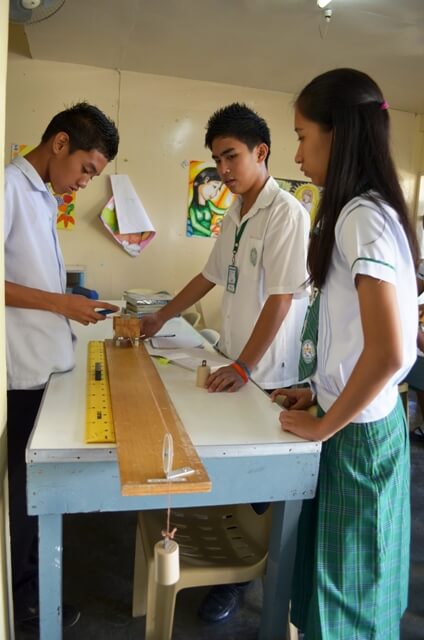TEACHING IS definitely one of the most wonderful professions in the world because, for one, you get to have a hand in molding the minds of the young. However, the demands can sometimes be too great to the extent that it can be very stressful and draining.
As a tyro in the field, I sometimes wonder where those great teachers I look up to derive their energy to teach.
I found a book called The Energy to Teach by Donald H. Graves . Quite interesting to me, I grabbed it and started reading. He has tips on how to avoid stress and increase productivity.
It is a very timely acquisition because recently, I and my colleagues have been talking about how the teacher’s energy wanes when he is not happy with his working environment.
This year, our principal went on a leave due to her health condition. An Officer-In-Charge was assigned to take her place. After two months, the OIC had to leave the school again. Another OIC was assigned, but she is also the OIC Assistant Superintendent and she was to serve the school for less than 15 days as our original principal is set to come back as school opens again next week after this long weekend. We still have to play by ear, though, if she is really coming back this week.
If you don’t think that is stressful, think of minor changes in rules. Think of changes in how the school is run. Think of having to emotionally be prepared for changes. Although we are doing our best, we still have worries because these people have expectations and they are not very well aware of how the school is run since its foundation 15 years ago.
Moreover, our new superintendent has big dreams for the school. He wants the school to outshine other schools in the region in all competitions. He even wants the school to be one of the best in the country.
Honestly, we have the same dreams.
However, given the current system and facilities, it would be difficult.
In the past years, we have had several wins in national competitions — in research and during the summit of Regional Science High School. Last year, we represented the region in the National Super Quiz Bee.
There are not enough, though. It’s mediocre.
Unsatisfied, and curious of how we teach our students, the superintendent visits our school every now and then, unannounced. Although, I believe, we have nothing to fear, this gives us pressure. This gives stress to many of us, teachers.
Our argument is this: there is much pressure on us. We have to always score high in the National Achievement Test. We have to always win in competitions.
We can do that. No question.
Here’s the problem. When we achieve something, they would say: it’s expected. If we don’t, they would say: what kind of science high school is that?
This is not an excuse. Teachers are humans, too.
They say, to whom much is given, much is expected. Why are they expecting so much from us when they haven’t given us support?
Teachers from other school are thinking that we are receiving higher salaries than them. For their information, we don’t. We receive the same salaries as those in other schools.
Our privilege is that we have fewer students to teach. We have facilities that are a little better than other public schools. In exchange for these, we have to endure the criticism and to always work harder to please our administrators.
I am not complaining. I am very happy teaching in this school. I love the challenge. I would just like to say, teaching here already comes with so much pressure. Adding more pressure would not squeeze out more achievements from us. Too much pressure would make us less productive. I wish our administrators would sit down with us and talk to us. We want to feel that we are part of the education revolution and not merely machines that would eke out amazing results from meager input. If we want more profit, we have to invest more. A production plant cannot produce more by forcing workers to work harder without increasing the raw materials.
Yes, I have the energy to teach. Then again, the first law of thermodynamics states that energy can never be created. The energy output is always less than the input as some of it goes to the cold sink. It is therefore irrational to expect an efficiency of 100% even if teachers give it their all.
We have to work together, teachers and administrators. Surely, we can achieve our lofty vision, but certainly, there’s plenty of things to do.
Tomorrow, I’m going to the wilderness. I’ll grab this chance to recharge my spirit. When I come back, I hope I have more energy to go beyond teaching.







I believe in education and I respect impassioned educators. Your articles are very real because they are from daily experience and not some top-down office bureaucrat who blogs about education issues. For this reason, I request to feature your blog article on P3.
P3, http://www.p-3.ph, is a crowd-sourced, progressive, online Philippine news magazine that features blogs with perspectives on modern Filipino culture, progress-minded, social responsibility, environmentalism, and tolerance. All articles are submitted by bloggers and freelance writers. The only prerequisite is that the blogger/writer belong to the industry in which she/he writes; e.g. OFW writes on OFW issues, artists write about artist news, etc.
May I feature your blog post? I will provide all the necessary links and description of your blog.
Thanks.
Mark J. Bantigue
P3
220 Tomas Morato Avenue
Quezon City 1103 Philippines
http://www.p-3.ph
Tw: @P3dotPh
Fb: /P3dotPh
+63 918 919 3660
markbantigue@p-3.ph
Tw: @markbantigue
Fb: /markbantigue
Yes, sir. You may. Thank you.
That’s a great example, Gordon! Yes, teahcing is really about getting out of the way and it can be a hard lesson to learn because what matters most is not you, but rather how your students interact with each other.